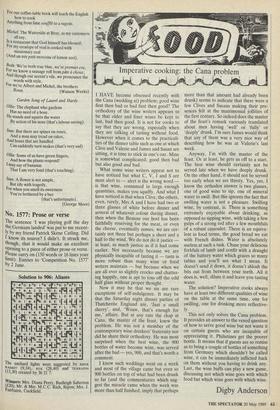„ A Imperative cooking: the Cana problem I
e ?
41...40"LalOgtk...."*...104L—fik*.e"mWw.—.01 I HAVE become obsessed recently with the Cana (wedding at) problem; good wine first then bad or bad first then good? The orthodoxy of the wine writers appears to be that older and finer wines be kept to last, bad then good. It is not for cooks to say that they are wrong, especially when they are talking of tasting without food. However when it comes to the practicali- ties of the dinner table such as one at which Clive and Valerie and James and Susan are sitting, it is time to stick in one's oar. Mine is somewhat complicated; good then bad but also good and bad.
What some wine writers appear not to have noticed but what C, V, J and S are most alert to — alert is the wrong word is that wine, consumed in large enough quantities, makes you squiffy. And what I have noticed is that when Clive, the others, even, rarely, Mrs A and I have had two or three glasses of white before dinner and several of whatever colour during dinner, then when the Beaune our host has been faithfully reserving for the meat, or even the cheese, eventually comes, we are cer- tainly not three but perhaps a sheet and a half to the wind. We do not do it justice at least, as much justice as if it had come earlier. Not necessarily because we are physically incapable of tasting it — taste is more robust than many wine or food writers maintain — but because when we are all ever so slightly crocko and chatter- ing happily, one is apt to toss off the odd half glass without proper thought.
Now it may be that we six are rare exceptions of self-indulgence. It may be that the Saturday night dinner parties of Thatcherite England are, 'Just a small sherry'; and, `Woaw, that's enough for me,' affairs. But at any rate the chap at Cana, the master of the feast, knew the problem. He was not a member of the contemporary wine drinkers' fraternity nor did he share their orthodoxy. He was most surprised when the best wine, the 900 bottles of water become wine, was served after the bad — yes, 900, and that's worth a comment.
I know such weddings went on a week and most of the village came but even so 900 bottles on top of what had been drunk so far (and the commentaries which sug- gest the miracle came when the week was more than half finished, imply that perhaps more than that amount had already been drunk) seems to indicate that there were a few Clives and Susans making their pre- sences felt at the matrimonial jollities of the first century. So indeed does the master of the feast's remark variously translated about men having `well' or 'fully' or `deeply' drunk. I'm sure James would think that any of them was a very nice way of describing how he was at Valerie's last week.
Anyway, I'm with the master of the feast. Or at least, he gets us off to a start. The best wine should certainly not be served late when we have deeply drunk. On the other hand, it should not be served too early when we are thirsty. Yes, yes, I know the orthodox answer is two glasses, one of good wine to sip, one of mineral water to swill. But this ignores the fact that swilling water is not a pleasure. Swilling wine, by contrast, is. There is something extremely enjoyable about drinking, as opposed to sipping wine, with taking a few gulps of a strong red after a few mouthfuls of a robust cassoulet. There is an equiva- lent in food terms, the good bread we eat with French dishes. Water is absolutely useless at such a task. Chase your delicious forkfuls of lamb and confit with a draught of the battery water which graces so many tables and you'll see what I mean. It doesn't send it down, it doesn't shlosh the bits out from between your teeth. All it does is, well, dilute it and leave you tasting water.
The solution? Imperative cooks always have at least two different qualities of wine on the table at the same time, one for swilling, one for drinking more reflective- ly.
This not only solves the Cana problem. It provides an answer to the vexed question of how to serve good wine but not waste it on certain guests who are incapable of appreciating it. Philistines get the poorer bottle. It means that if guests are so remiss as to bring a couple of bottles of something from Germany which shouldn't be called wine, it can be immediately inflicted back on them without you having to drink any. Last, the wine buffs can play a new game, discussing not which wine goes with which food but which wine goes with which wine.
Digby Anderson


































































 Previous page
Previous page